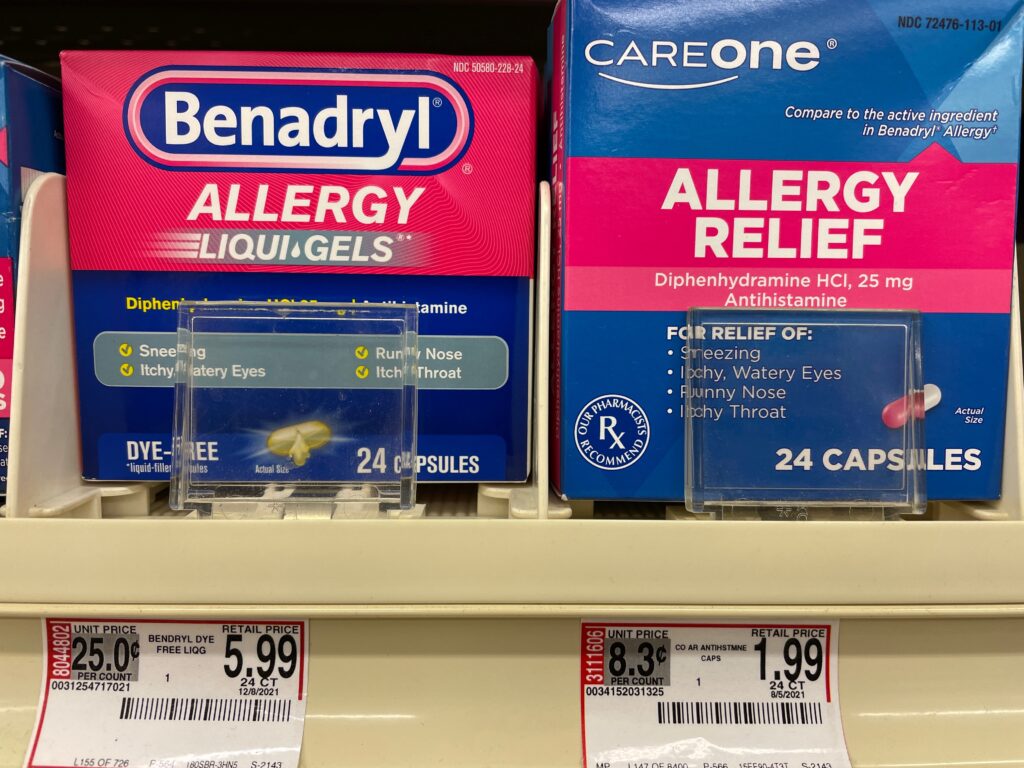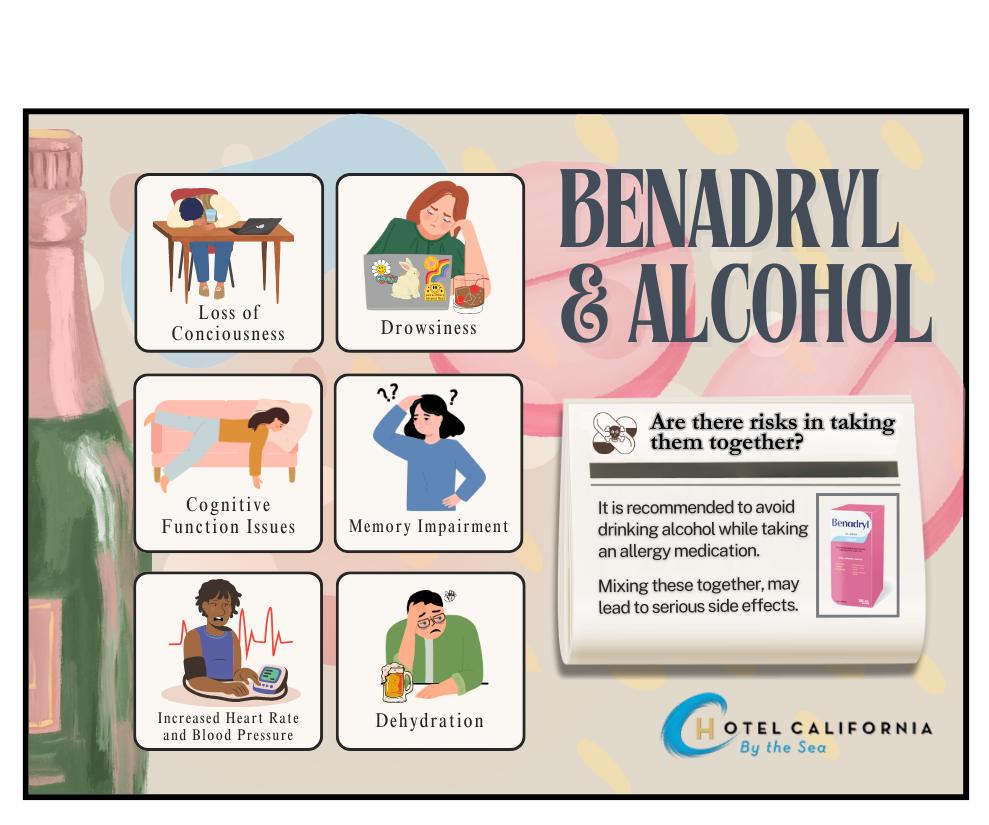Benadryl and Alcohol: What are the risks?
Can Benadryl and alcohol be taken together? Both substances are central nervous system depressants and should be avoided at all costs. Benadryl is a popular over-the-counter antihistamine medication. It can cause drowsiness and sedation. Alcohol is a depressant substance legally sold that can also cause effects of calmness and sedation. Combining the two substances can intensify drowsiness and impair cognitive functions, causing focus issues and even difficulty performing physical tasks.

In cases of misuse or abuse. Users will combine an antihistamine such as Benadryl with alcohol to enhance the sedative and calming effects. They use them together to achieve an even greater high or sense of intense relaxation. This can cause an interaction of dangerous consequences.
Alcohol
Alcohol is a central nervous system depressant. It is one of the most widely abused substances worldwide. It is a legal substance. Due to its ease of access, ease of availability and cultural acceptability, alcohol abuse is one of the most common substance addictions in the US. Alcohol use disorder is a chronic brain disorder that is characterized by reoccurring patterns of alcohol use that result in negative consequences. When alcohol is used or combined with other central nervous system depressants, it can cause dangerous effects that can lead to overdose and coma.

Benadryl and Antihistamines
Benadryl is the brand name for the generic drug diphenhydramine. The antihistamine diphenhydramine works by interfering with the actions of histamine in your body. Histamine is involved in your body’s immune system response to allergens. It is the reason why you develop a stuffy nose, itchy eyes, itchy skin or an itchy throat. Benadryl typically has a short lifespan and leaves the system within 4-6 hours.
Benadryl is a first-generation antihistamine. It is an older category of drugs. Another first-generation antihistamines includes brompheniramine, which is children’s Dimetapp. It is typically used to treat one-time allergic reactions. For example, you might be exposed to something that results in an allergic reaction of you breaking out into hives. In this case, taking Benadryl will help to immediately calm the allergic reaction you are having. First-generation antihistamines can cause side effects such as drowsiness, confusion, and impaired thinking. These types of antihistamines are more likely to reach the brain and affect the central nervous system.
Second-generation antihistamines are the newer types of allergy medications. They include Zyrtec (cetirizine), Claritin (loratadine) and Allegra (fexofenadine). These allergy medications tend to have fewer side effects because it doesn’t impact the central nervous system as much as first-generation antihistamines. Second-generation antihistamines are often used to treat conditions such as chronic seasonal allergies because they do not typically cause drowsiness.
Check Your Insurance Coverage for FREE
Find out if your insurance covers addiction treatment in minutes. We accept most insurance!
Risks of Benadryl and Alcohol
- Drowsiness and Sedation. Mixing Benadryl and alcohol can lead to amplified effects of intense drowsiness and sedation. This impairs your coordination and reaction speed leading to impairment of daily function activities. Both substances will slow down your central nervous system and impact the ability to perform physical and mental tasks that require alertness.
- Loss of consciousness. When taking both substances, you can be prone to mental blackouts and increase the likelihood of falls or other accidents.
- Learning and memory impairment. Benadryl blocks the action of the neurotransmitter acetylcholine, which is a chemical that is important in learning and memory. Alcohol is also known to affect temporary learning and memory. When combined, it can cause serious issues such as memory lapses over time.
- Dehydration. Both Benadryl and alcohol have dehydrating effects on the body. When combined, there is a higher chance of dehydration, which can lead to discomfort and unpleasant symptoms with alcohol hangovers. In extreme cases, severe dehydration can lead you to a hospital visit for emergency care.
- Dementia. A study found taking an anticholinergic drug like Benadryl once per day for at least 3 years, can raise the risk of dementia. Excessive alcoholic consumption has also been associated with symptoms of dementia. When taking the substances together, it exponentially increases the risk of developing dementia impacting cognitive functions such as memory retention.
- Confusion. Mixing Benadryl and alcohol can lead to feelings of confusion and a disconnect from reality. It can lead to hallucinations, seizures and even difficulty breathing.
- Drop in heart rate. Both substances can lead to a drop in heart rate, slowed breathing and cardiovascular issues.
- Misuse and abuse. Taking Benadryl and alcohol can actually lead to the abuse of both drugs. Some people use them as sleep aids. When taken together it can amplify the sedative and sleepy effects. However, the combination of the drugs can actually do the opposite of providing sleep. It can make you dizzy, cause nausea, prevent you from sleeping through the night and be very detrimental to your overall sleep quality.
- Overdose. Using both drugs together can cause accidental overdose. Symptoms of overdose include extreme drowsiness, blurred vision, confusion and respiratory depression. Since both drugs are depressants, there is a much higher risk of experiencing respiratory depression and can even intensify and increase the risk of an alcohol overdose.
Who is at most risk when taking Benadryl and Alcohol?
Everyone reacts differently to medications. When alcohol is added to the mixture, there can be even more side effects and adverse experiences. Those who are at the most risk of dangerous side effects from Benadryl and alcohol are older adults and women. Older adults are more at risk of experiencing adverse reactions. Those who are taking multiple drugs, whether they are prescription or over-the-counter, are also at risk if they take Benadryl and alcohol. This combination should be avoided completely.
Reach out to Hotel California by the Sea
We specialize in treating addiction and other co-occurring disorders, such as PTSD. Our Admissions specialists are available to walk you through the best options for treating your addiction.
Treatment for Substance Use Disorder
There have been reports and studies showing that taking too much Benadryl can lead to people experiencing hallucinations, seizures and difficulty breathing. All of that can be worsened with added alcohol use. It is recommended to wait at least 2 hours after drinking to take Benadryl if you need to. It would be best to wait until alcohol is completely out of your system in 36 hours to take the antihistamine. Benadryl and alcohol together should be avoided because it can create dangerous side effects surrounding sedation and respiratory depression. Not only can it intensify central nervous system depression, it can also lead to the development of an alcohol use disorder.
At Hotel California by the Sea, we treat all types of substance use disorder, including alcohol use disorder. We offer treatment at all levels of care including detox, residential, PHP and IOP. We also utilize evidence-based methods including CBT, DBT and EMDR therapy. Hotel California by the Sea is dedicated to helping clients achieve their goals in sobriety and overcome their addiction.
References:
https://www.healthline.com/health/allergies/benadryl-alcohol
https://www.medicalnewstoday.com/articles/321078
https://www.goodrx.com/classes/antihistamines/drinking-alcohol-with-allergy-meds-benadryl-zyrtec
https://www.avenuesrecovery.com/understanding-addiction/benadryl-addiction/benadryl-and-alcohol
https://www.buzzrx.com/blog/can-you-mix-alcohol-with-antihistamines
https://www.singlecare.com/blog/benadryl-allergy-medicine-and-alcohol/
